Gathering
What Was Sown
Revelation
14:16-20
r14v
At our previous encounter,
we looked at two patterns involving the last part of this chapter and one
for the whole chapter. link. Now we will
look closely at the final verses.
14:15
Reaping
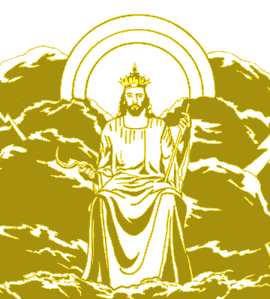 "And another angel came out of the temple, crying with a loud voice to
him that sat on the cloud, Thrust in thy sickle, and reap: for the time
is come for thee to reap; for the harvest of the earth is ripe. And he
that sat on the cloud thrust in his sickle on the earth; and the earth
was reaped." (Rev. 14:15, 16).
"And another angel came out of the temple, crying with a loud voice to
him that sat on the cloud, Thrust in thy sickle, and reap: for the time
is come for thee to reap; for the harvest of the earth is ripe. And he
that sat on the cloud thrust in his sickle on the earth; and the earth
was reaped." (Rev. 14:15, 16).
Imagery for the coming
Christ is drawn largely from the story of the wheat and the tares. Read
Matt.
13:24-30).
Getting ripe
Is the harvest ripe at the
time the judgment begins? No, the ripening process of spiritual maturity
necessary to stand while the four winds of strife blow is the sealing,
under the symbols of chapter 7, re0702b.
The preadvent judgment is, in fact, a time for the end-time preparation.
We also see the preparation
under the harvest motif in the symbol of the latter rain. In Palestine,
the former rain developed the plants and the latter rain (in the spring)
was for ripening. This is the typical cycle of growing winter wheat today.
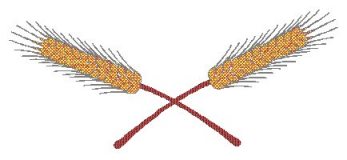 "Be glad then, ye children of Zion, and rejoice in the LORD your God: for
he hath given you the former rain moderately, and he will cause to come
down for you the rain, the former rain, and the latter rain in the first
month. And the floors shall be full of wheat, and the fats shall
overflow with wine and oil. . . . And it shall come to pass afterward,
that I will pour out my spirit upon all flesh; and your sons and your daughters
shall prophesy, your old men shall dream dreams, your young men shall see
visions." (Joel 2:23-28; also see ps05005,
jl0313,
zc1001,
mr0426ff).
"Be glad then, ye children of Zion, and rejoice in the LORD your God: for
he hath given you the former rain moderately, and he will cause to come
down for you the rain, the former rain, and the latter rain in the first
month. And the floors shall be full of wheat, and the fats shall
overflow with wine and oil. . . . And it shall come to pass afterward,
that I will pour out my spirit upon all flesh; and your sons and your daughters
shall prophesy, your old men shall dream dreams, your young men shall see
visions." (Joel 2:23-28; also see ps05005,
jl0313,
zc1001,
mr0426ff).
The angel came
out of the temple
What do we know about coming
out of the temple? What significant event in the sanctuary system is marked
by the high priest coming out of the temple? It means that the atonement
process has ended. It is too late to process unconfessed sins and too late
for the cleansing that must follow le1620ff.
Those who did not humble their souls during that special day were cut off
from the camp le2329.
This shows the judgment aspect of the day of atonement. Christ makes atonement
for us in the heavenly sanctuary. When He comes out, human probation will
close.
In a different set of symbols,
Christ is seated on the throne of judgment, 0509a.
He is given the book or scroll, 0503.
When all the seals have been broken, the righteous are acquitted and the
atonement stops, 0801d.
"And at that time shall Michael
stand up [after being seated in judgment], the great prince which standeth
for the children of thy people: and there shall be a time of trouble, such
as never was since there was a nation even to that same time: and at that
time thy people shall be delivered, every one that shall be found written
in the book [of judgment]." See the context of this verse below.
14:17-19
The wicked gathered
as grapes
"And another angel came
out of the temple which is in heaven, he also having a sharp sickle. And
another angel came out from the altar, which had power over fire; and cried
with a loud cry to him that had the sharp sickle, saying, Thrust in thy
sharp sickle, and gather the clusters of the vine of the earth; for her
grapes are fully ripe. And the angel thrust in his sickle into the earth,
and gathered the vine of the earth, and cast it into the great winepress
of the wrath of God." (Rev. 14:17-19).
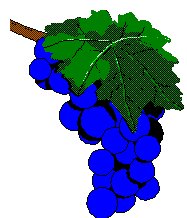 The
wine concept elsewhere in the Scriptures
The
wine concept elsewhere in the Scriptures
God, through Isaiah identified
the divided kingdom of His people as a vineyard that had failed because
of apostasy is05. The vineyard
is one of many motifs in the Song of Solomon. See so0106b,
so0812.
Jesus identified the Jewish leaders as unfaithful keepers of the vineyard
lu2009ff.
False doctrine of the end-time religious power is presented as the wine
of Babylon, 1408e.
And in the next chapter, we will see bad wine as apostasy predicted by
Moses, 1503+. Usually
the the vineyard concepts are associated with true religion that turned
bad.
Time relationships
of the grain and the grapes
By comparing the concept
of silence with the seventh seal, we may understand a brief time between
the harvest (for the grain) and the vintage (for the grapes). The sealed
(harvested) righteous are not taken to heaven immediately, however. During
this brief interval, the sealed ones are protected from the forces of the
enemy. It is the time of silence in heaven, (or perhaps after it). 0800.
This time of protection is seen in the ninety-first psalm.
"He that dwelleth in the
secret place of the most High shall abide under the shadow of the Almighty.
I will say of the LORD, He is my refuge and my fortress: my God; in him
will I trust. Surely he shall deliver thee from the snare of the fowler,
and from the noisome pestilence. He shall cover thee with his feathers,
and under his wings shalt thou trust: his truth shall be thy shield and
buckler. Thou shalt not be afraid for the terror by night; nor for the
arrow that flieth by day; Nor for the pestilence that walketh in darkness;
nor for the destruction that wasteth at noonday. A thousand shall fall
at thy side, and ten thousand at thy right hand; but it shall not come
nigh thee. Only with thine eyes shalt thou behold and see the reward of
the wicked." (Ps. 91:1-8). Also jl0313.
The gathering
time
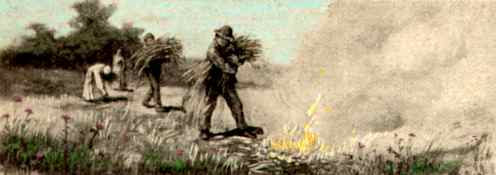 Notice, in the text, that the grapes are first gathered, then thrown into
the winepress. "And the angel thrust in his sickle into the earth, and
gathered the vine of the earth, and cast it into the great winepress of
the wrath of God." (Rev. 14:19).
Notice, in the text, that the grapes are first gathered, then thrown into
the winepress. "And the angel thrust in his sickle into the earth, and
gathered the vine of the earth, and cast it into the great winepress of
the wrath of God." (Rev. 14:19).
Jesus' story of the wheat
and tares is about this same time of harvest. It sheds more light on the
events. "Gather ye together first the tares, and bind them in bundles to
burn them: but gather the wheat into my barn." (Mat. 13:30). Here we see
that the binding comes before the wheat harvest. This agrees with the order
we have seen for the harvest and the vintage because the binding is separate
from the throwing the grapes into the winepress. Image from
a book in the public domain.
From
what we have studied and some concepts based on other passages, I see the
following sequence of events. I don't claim that this list is perfect.
We have plenty of solid and clear statements of Scripture to guide us in
being faithful to God. Let us listen to His voice through the Word. Then
when trials or special events come, He will provide the strength to endure
them and the wisdom to know how to relate to them.
| Preadvent
judgment begins; this point is in the past (14:6, 7) |
| Righteous
preparing to stand, 6:17; 7:1-4; wicked (including false Christians) are
bound in bundles, 14:18; Matt. 13:30 |
| Image created;
false worship enforced, 13:14-17, false Christians are shaken out, 6:13 |
| Sealing of
righteous in process, 7:1-4 |
| Latter rain
prepares for loud cry of final appeal, Joel 2:23-28; Rev. 18:1 |
| Sealing ends,
Ezek. 9:4; judgment ends; probation closes, 22:11 |
| Time of silence
or Jacob's trouble for righteous; special resurrection; time of trouble
begins, Dan. 12:1; Christ begins to reign (throws sickle into the earth),
11:15; 14:16; seven last plagues, 16 |
| General resurrection
of righteous dead; righteous living join them and both are taken to heaven,
John 14:1-3, 1 Thess. 4:16, 17. |
| Wicked thrown
into the winepress (wicked living killed) 19:21 |
| Millennium
begins (time of judgment of the dead; 11:18) All righteous will then be
living and all wicked will be dead |
| Millennium
ends with another judgment and the destruction of the wicked by fire (or
trampling the winepress) 20:9-15. |
Earlier, we looked at three general
points in time, link
.
Binding
The concept of being bound
at the end of time is significant. In a sense, the wicked bind themselves.
"Associate yourselves, O
ye people, and ye shall be broken in pieces; and give ear, all ye of far
countries: gird yourselves, and ye shall be broken in pieces; gird yourselves,
and ye shall be broken in pieces. Take counsel together, and it shall come
to nought; speak the word, and it shall not stand: for God is with us.
For the LORD spake thus to me with a strong hand, and instructed me that
I should not walk in the way of this people, saying, Say ye not, A confederacy,
to all them to whom this people shall say, A confederacy; neither fear
ye their fear, nor be afraid. Sanctify the LORD of hosts himself; and let
him be your fear, and let him be your dread. And he shall be for a sanctuary;
but for a stone of stumbling and for a rock of offence to both the houses
of Israel, for a gin and for a snare to the inhabitants of Jerusalem."
(Isa. 8:9-14)
"Be ye not unequally yoked
together with unbelievers: for what fellowship hath righteousness with
unrighteousness? and what communion hath light with darkness?" (2 Cor.
6:14)
Very little imagination
is needed to see what will happen as the winds of strife (7:1-4) blow with
more force.
The world is already starting to fall apart, I believe people will give
up liberty of conscience for assumed security. This will mean strong labor
unions and civil militia hate groups which I expect to take over control
of people, especially in the cities. If you have ever witnessed a mob in
action, you have sensed the power of Satanic control.
Of course, the working force
does not carry all the blame for such strife. The wealthy members of society
will also bind themselves, with the control of the financial interests
of the world in a very few hands. Both the unions and the commercial giants
will be manipulated by the false religious power. Notice how Daniel describes
the end of time.
"And at the time of the end
shall the king of the south push at him: and the king of the north shall
come against him like a whirlwind, with chariots, and with horsemen, and
with many ships; and he shall enter into the countries, and shall overflow and pass over. He shall enter also into the
glorious land, and many countries shall be overthrown: but these shall
escape out of his hand, even Edom, and Moab, and the chief of the children
of Ammon. He shall stretch forth his hand also upon the countries: and
the land of Egypt shall not escape.
countries, and shall overflow and pass over. He shall enter also into the
glorious land, and many countries shall be overthrown: but these shall
escape out of his hand, even Edom, and Moab, and the chief of the children
of Ammon. He shall stretch forth his hand also upon the countries: and
the land of Egypt shall not escape.  But he shall have power over the treasures of gold and of silver, and over
all the precious things of Egypt: and the Libyans and the Ethiopians shall
be at his steps. But tidings out of the east and out of the north shall
trouble him: therefore he shall go forth with great fury to destroy, and
utterly to make away many.
But he shall have power over the treasures of gold and of silver, and over
all the precious things of Egypt: and the Libyans and the Ethiopians shall
be at his steps. But tidings out of the east and out of the north shall
trouble him: therefore he shall go forth with great fury to destroy, and
utterly to make away many.
 And he shall plant the tabernacles of his palace between the seas in the
glorious holy mountain; yet he shall come to his end, and none shall help
him. And at that time shall Michael stand up, the great prince which standeth
for the children of thy people: and there shall be a time of trouble, such
as never was since there was a nation even to that same time: and at that
time thy people shall be delivered, every one that shall be found written
in the book." (Dan. 11:40-12:1).
And he shall plant the tabernacles of his palace between the seas in the
glorious holy mountain; yet he shall come to his end, and none shall help
him. And at that time shall Michael stand up, the great prince which standeth
for the children of thy people: and there shall be a time of trouble, such
as never was since there was a nation even to that same time: and at that
time thy people shall be delivered, every one that shall be found written
in the book." (Dan. 11:40-12:1).
Searching the detailed meaning
of this passage is beyond the scope of our study, but you can see where
the the end-time power will have tremendous  political
political  financial and
financial and  religious power.
religious power.
We face a time of trial,
but in the end, Daniel's people, you and me, can be found written in the
book of the preadvent judgment, prepared to stand. The next verse in Daniel
describes the resurrection, then "And they that be wise shall shine as
the brightness of the firmament; and they that turn many to righteousness
as the stars for ever and ever." (Dan. 12:3). That is the reward for the
faithful.
14:20, note a
Winepress of
wrath of God
^ And the angel
thrust in his sickle into the earth, and gathered the vine of the earth,
and cast it into the great winepress of the wrath of God. And the winepress
was trodden without the city, and blood came out of the winepress, even
unto the horse bridles, by the space of a thousand and six hundred furlongs.
(Rev. 14:19, 20).
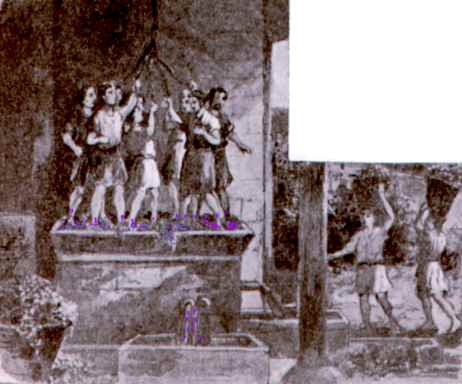 As indicated earlier, I see the end-of-world punishment separate from the
punishment at the end of the millennium. Here these two are symbolized
by casting into the winepress and treading the winepress. Does this mean
some are punished twice? Yes, although we know that in all, God is fair.
Punishment will be according to guilt.
As indicated earlier, I see the end-of-world punishment separate from the
punishment at the end of the millennium. Here these two are symbolized
by casting into the winepress and treading the winepress. Does this mean
some are punished twice? Yes, although we know that in all, God is fair.
Punishment will be according to guilt.
Image from
a book in the public domain.
"But and if that servant say
in his heart, My lord delayeth his coming; and shall begin to beat the
menservants and maidens, and to eat and drink, and to be drunken; The lord
of that servant will come in a day when he looketh not for him, and at
an hour when he is not aware, and will cut him in sunder, and will appoint
him his portion with the unbelievers. And that servant, which knew his
lord's will, and prepared not himself, neither did according to his will,
shall be beaten with many stripes. But he that knew not, and did commit
things worthy of stripes, shall be beaten with few stripes. For unto whomsoever
much is given, of him shall be much required: and to whom men have committed
much, of him they will ask the more." (Luke 12:45-48).
Those who receive
punishment
The end-of-world punishment
is only for those who worship the beast and its image (14:9). The rest
of the wicked are dead at this time. This is still future as these comments
are prepared (1998). We have seen part of this picture in studying the
four horses, reo601c.
As I understand it, the last two of the four picture the righteous and
wicked living at the end of time and represent the larger groups of all
the people of the New Testament era. The righteous and the wicked both
pass through very intense experiences in the final conflict between good
and evil.
"And the dragon was wroth
with the woman, and went to make war with the remnant of her seed, which
keep the commandments of God, and have the testimony of Jesus Christ."
re1217.
Outside the city
Notice in verse 20, that
the winepress is "trodden without the city." This is pictured as well in
chapter 20: "And when the thousand years are expired, Satan shall be loosed
out of his prison, And shall go out to deceive the nations which are in
the four quarters of the earth, Gog and Magog, to gather them together
to battle: the number of whom is as the sand of the sea. And they went
up on the breadth of the earth, and compassed the camp of the saints about,
and the beloved city: and fire came down from God out of heaven, and devoured
them." (20:7-9). re2009a
Let's not miss the
striking comparison that this imagery leads us to. "Wherefore Jesus also,
that he might sanctify the people with his own blood, suffered without
the gate." (Heb. 13:12). Our Lord was crucified outside the city of Jerusalem.
He suffered the punishment of the wicked who will be forever lost! That
is the penalty we deserve to pay. O Lord, may we be sanctified by that
blood!
14:20 b
Blood from the
winepress
"Who is this that cometh from
Edom, with dyed garments from Bozrah? this that is glorious in his apparel,
travelling in the greatness of his strength? I that speak in righteousness,
mighty to save. Wherefore art thou red in thine apparel, and thy garments
like him that treadeth in the winefat? I have trodden the winepress alone;
and of the people there was none with me: for I will tread them in mine
anger, and trample them in my fury; and their blood shall be sprinkled
upon my garments, and I will stain all my raiment. For the day of vengeance
is in mine heart, and the year of my redeemed is come. And I looked, and
there was none to help; and I wondered that there was none to uphold: therefore
mine own arm brought salvation unto me; and my fury, it upheld me. And
I will tread down the people in mine anger, and make them drunk in my fury,
and I will bring down their strength to the earth." (Isa. 63:1-6)
Edom was the traditional
enemy of God's people in Isaiah's time. Here the prophet pictures the Lord
returning victoriously. This passage must be the source of the symbols
in 14:20, although it may also represent the one on the white horse in
19:11-21.
Jesus, in yielding His life
for us, also tread the winepress alone. He was alone in Gethsemane, except
for the Father (John 16:32). On the cross, even the Father withdrew (Matt.
27:46). He thus gained the victory over Satan, clearing the way to finally
bring an end to sin and sinners. Praise God!
Blood to the
horse bridles
"And when Jehu was come to
Jezreel, Jezebel heard of it; and she painted her face, and tired her head,
and looked out at a window. And as Jehu entered in at the gate, she said,
Had Zimri peace, who slew his master? And he lifted up his face to the
window, and said, Who is on my side? who? And there looked out to him two
or three unuchs. And he said, Throw her down. So they threw her down: and
some of her blood was sprinkled on the wall, and on the horses: and he
trode her under foot. And when he was come in, he did eat and drink, and
said, Go, see now this cursed woman, and bury her: for she is a king's
daughter. And they went to bury her: but they found no more of her than
the skull, and the feet, and the palms of her hands. Wherefore they came
again, and told him. And he said, This is the word of the LORD, which he
spake by his servant Elijah the Tishbite, saying, In the portion of Jezreel
shall dogs eat the flesh of Jezebel: And the carcase of Jezebel shall be
as dung upon the face of the field in the portion of Jezreel; so that they
shall not say, This is Jezebel." (2 Kings 9:30-37). Also ez0909.
So Jezebel, who led the people
of Israel into idolatry, may be seen here to represent the final destruction
of evil doers.
The wicked people could be
represented by a horse, See
re0601c.
Bridles are used to direct the horses and could indicate completeness of
the punishment by including the leaders of those who try to take the New
Jerusalem at the end of the thousand years. Satan, of course is the general.
Jesus, who did not yield
to evil even to the point of death, trampled the winepress outside the
city of Old Jerusalem. There He obtained the victory that vindicated Him
in His final work of cleansing this work of sin. He will then destroy the
leader of evil and the followers, the root and the branches (Mal. 4:1),
the bridle and the horse. Praise God.
1,600 furlongs
I do not have a satisfactory
idea of the source or meaning of this distance symbol. The holy city has
four walls, but each is 12,000 furlongs long, not 400 (Rev.
21:16). It has twelve foundations and twelve gates. Walls may be seen
as representing divine protection. They are 144 cubits (apparently the
thickness) (21:17). At the end of the millennium, the wicked are gathered
from the four corners of the earth to surround the city (20:8) — to attack
its four sides r20o.
Perhaps the blood of the wicked here, as spread symbolically over 4 X 400
furlongs, is contrasted with the 4 X 12,000 furlong perimeter of the city.
Or the trampling is in the valley of Gehenna which is elsewhere used as
a symbol of the burning destruction of the wicked or "hell."
|
This has been a significant chapter.
We may praise God who will lead and care for those who heed its warnings
and follow the Lamb of Mount Zion.
|

 "And another angel came out of the temple, crying with a loud voice to
him that sat on the cloud, Thrust in thy sickle, and reap: for the time
is come for thee to reap; for the harvest of the earth is ripe. And he
that sat on the cloud thrust in his sickle on the earth; and the earth
was reaped." (Rev. 14:15, 16).
"And another angel came out of the temple, crying with a loud voice to
him that sat on the cloud, Thrust in thy sickle, and reap: for the time
is come for thee to reap; for the harvest of the earth is ripe. And he
that sat on the cloud thrust in his sickle on the earth; and the earth
was reaped." (Rev. 14:15, 16).
 "Be glad then, ye children of Zion, and rejoice in the LORD your God: for
he hath given you the former rain moderately, and he will cause to come
down for you the rain, the former rain, and the latter rain in the first
month. And the floors shall be full of wheat, and the fats shall
overflow with wine and oil. . . . And it shall come to pass afterward,
that I will pour out my spirit upon all flesh; and your sons and your daughters
shall prophesy, your old men shall dream dreams, your young men shall see
visions." (Joel 2:23-28; also see
"Be glad then, ye children of Zion, and rejoice in the LORD your God: for
he hath given you the former rain moderately, and he will cause to come
down for you the rain, the former rain, and the latter rain in the first
month. And the floors shall be full of wheat, and the fats shall
overflow with wine and oil. . . . And it shall come to pass afterward,
that I will pour out my spirit upon all flesh; and your sons and your daughters
shall prophesy, your old men shall dream dreams, your young men shall see
visions." (Joel 2:23-28; also see  The
wine concept elsewhere in the Scriptures
The
wine concept elsewhere in the Scriptures
 Notice, in the text, that the grapes are first gathered, then thrown into
the winepress. "And the angel thrust in his sickle into the earth, and
gathered the vine of the earth, and cast it into the great winepress of
the wrath of God." (Rev. 14:19).
Notice, in the text, that the grapes are first gathered, then thrown into
the winepress. "And the angel thrust in his sickle into the earth, and
gathered the vine of the earth, and cast it into the great winepress of
the wrath of God." (Rev. 14:19).
 As indicated earlier, I see the end-of-world punishment separate from the
punishment at the end of the millennium. Here these two are symbolized
by casting into the winepress and treading the winepress. Does this mean
some are punished twice? Yes, although we know that in all, God is fair.
Punishment will be according to guilt.
As indicated earlier, I see the end-of-world punishment separate from the
punishment at the end of the millennium. Here these two are symbolized
by casting into the winepress and treading the winepress. Does this mean
some are punished twice? Yes, although we know that in all, God is fair.
Punishment will be according to guilt.